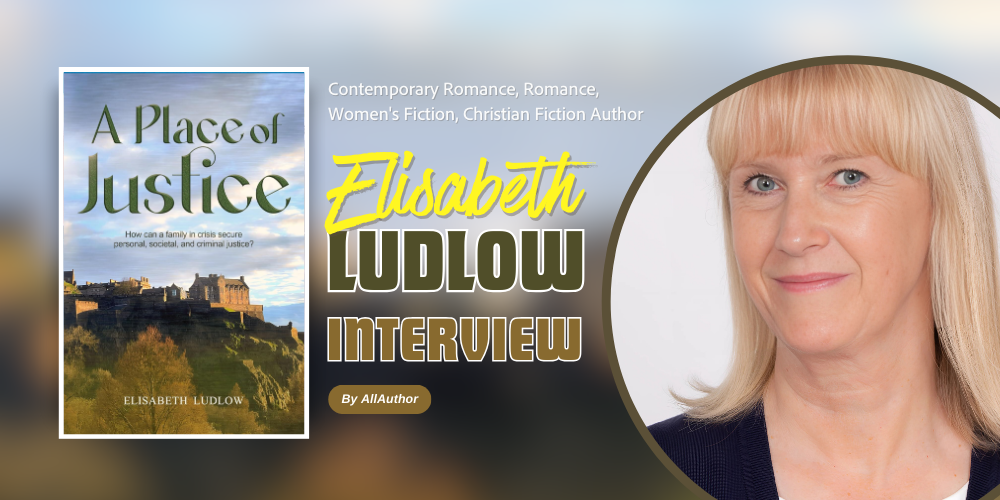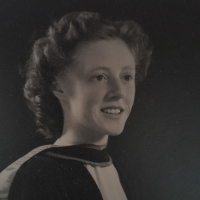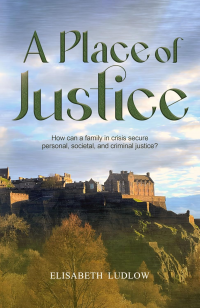Genre:
Contemporary Romance Romance Women's Fiction Christian Fiction- Country: United Kingdom
- Books: 1
- Profession: University management & Modern Language teacher
- Born: 12th February
- Member Since: Sep 2024
- Profile Views: 432
- Followers: 26
- VISIT AUTHOR: Twitter, Amazon,
I have a passion for writing; the words flow relatively easily. Having written in other genres, mainly academic, 'A Place of Justice' is my first novel, based partly in Edinburgh, where I did my undergraduate degree. I am in a delightful portfolio stage of life, working as a charity trustee, with emeritus status at the university where I worked, and dipping into Spanish once a week, learning more about art, and discovering the joys of exercise. I am married with two children, two grandchildren, and a golden retriever rescue dog. This photo is of my dear mother, who graduated from university in the late 1940s, then a rare achievement for a woman.
Elisabeth Ludlow's Books
Stay in the loop on books by Elisabeth Ludlow. See upcoming and best-selling books by the author here. You'll also find the deals on books by Elisabeth Ludlow.
** Please note that the information or price displayed here may not be the updated. Make sure to double-check the latest book price before buying books.
** Also, there might be other books by Elisabeth Ludlow not listed on AllAuthor.
| Book |
|---|
A Place of Justice: How can a family in crisis secure personal, societal, and criminal justice?by Elisabeth LudlowPublish: Sep 15, 2024Crime Fiction Mystery Contemporary Romance Romantic Suspense |
Elisabeth Ludlow Interview On 12, Feb 2025
 "Elisabeth Ludlow has a passion for writing, with words flowing naturally across various genres. Having previously written primarily in academic fields, “A Place of Justice” marks her debut novel, partly set in Edinburgh, where she completed an undergraduate degree. Married with two children, two grandchildren, and a beloved golden retriever rescue dog, Elisabeth draws inspiration from a life rich in learning and experience."
"Elisabeth Ludlow has a passion for writing, with words flowing naturally across various genres. Having previously written primarily in academic fields, “A Place of Justice” marks her debut novel, partly set in Edinburgh, where she completed an undergraduate degree. Married with two children, two grandchildren, and a beloved golden retriever rescue dog, Elisabeth draws inspiration from a life rich in learning and experience."
To be frank, the story grew as I wrote. From reading about other writers, I know that some novels are carefully planned, and others evolve. Mine was a mix of the two; it evolved from memories of my student days in Edinburgh, but as the characters took shape, I started creating a clear plan.
How did your experience in Edinburgh shape the setting and atmosphere of the novel?The city was a huge influence. As Emily says in Chapter 12, Edinburgh is “achingly beautiful”. It’s one of my favourite places in the world. Almost without planning, the city rather neatly became the base for the story in the first, last, and in one middle chapter. I like to think that Edinburgh is a character in my novel.
Having written mostly academic work before, how did transitioning into fiction differ for you? What challenges did you face?I actually felt quite liberated being able to write fiction, and not having to insert footnotes, or read other academic works during the whole process. However, research for the novel was just as vital as for my doctoral thesis, and having researched for my academic work was excellent preparation, and helped me to be equally rigorous with all the detail.
What do you think are the most important skills an author needs to develop when writing their first novel?Absolute commitment to the process, willingness to revise and update, ability to build structure and – though I’m not sure it’s a skill – huge enthusiasm for the task and for the whole project. This is something you are giving birth to, so it requires great passion along with much work.
How do you balance your various roles—charity trustee, emeritus status at the university, and your writing? Do these experiences influence your writing process?I enjoy variety and this portfolio life is one of the joys of retirement. My other roles only influence my writing process in the sense that writing and being creative is totally different from trustee work which requires a business-like approach and my emeritus role which is relational in a very stimulating way as I’m interacting with interesting minds and people with a sophisticated sense of humour. Family is also vital to me, and I’m loving spending time with our two wonderful children, and getting to know our two beautiful grandchildren.
You mention your love of Spanish and art; how do these passions find their way into your writing, if at all?My love of modern languages is definitely part of the book, though sadly Spanish doesn’t get a mention. French, German, and Italian all play their part, be it via Luke as a student, Tina who is German, or Giovanni and Carla who each throw the occasional Italian word into the mix. Art is also woven into the book; my visits to Leighton House in London are revealed in the reference to its Arab Hall, and I make occasional references to artwork in buildings.
Can you share a bit about the process of creating the characters in “A Place of Justice”? How did they evolve?The main characters – Luke, Emily, Jimmy, Tina, Archie – evolved subconsciously from my student days, not based on specific people, but they grew out of my memories of being an undergraduate in Edinburgh. I guess they are a compendium of a huge number of people I knew at that time. The younger generation – Lily, Jessie, and Xander – were influenced by contact with thirty-somethings in my college work, and are also my children’s demographic, though I was at great pains not to base any of those characters on my actual children. Having said that, I don’t believe that any writers can dissociate themselves totally from personal experience, but again I emphasise that the trends of each generation influenced me, rather than specific individuals.
As someone who values exercise, how does physical activity impact your creativity and writing routine?It’s important to take a break from the writing desk. It’s not only vital for physique but it’s also a great opportunity to indulge in the “long view” of a book. My doctoral supervisor introduced this brilliant concept of the long view to me, that is, taking a break from the current focus of a paragraph, a theme, part of a chapter, and looking at the overall picture; I’m so grateful to her for that. Walks in the countryside, often with our dog, enabled me to insert new ideas, rephrase a sentence to my satisfaction, and streamline the plot. Fortunately I have a good memory, so I was able to remember all of this, and jot down my inspiration once home again. I also love going to the gym, to refresh my mind as well as my body.
What role does your family, especially your mother, play in your writing journey? How has her legacy influenced you?My mother was a beautiful woman, who had a great understanding and skill with language, combined with a sense of humour which fortunately I share. Situations which make me laugh often remind me of her; I know she would have laughed with me. My husband has been a tremendous inspiration as I worked on the book in the summer of 2023. He believed in me, and, most surprising of all to me, agreed to read each chapter as I produced it. That’s love!
Do you have any favorite authors or books that have influenced your writing style or approach?Although I wouldn’t dream of comparing myself with such successful authors, I believe that my writing style and approach is strongly influenced by a combination of Alexander McCall Smith, Anita Shreve, Nevil Shute, John Grisham, and Victoria Hislop. I love to read books which inspire, have strong relatable characters, and have a satisfying ending leaving the reader feel uplifted, and prompting them to keep thinking about the novel long after they’ve finished reading.
What advice would you give to someone who is considering writing their first novel but isn’t sure where to start?I would advise them as I was advised by an author friend: “Just start writing!” Gift yourself a quiet time and solitary space as often as you can. Make this a regular slot, a date with yourself. Get excited about the story. Don’t neglect that all important research. And see how your enthusiasm grows as over time, you and your novel become one.
How do you approach the revision process? Do you have a specific method for editing your work?I did this meticulously, reading through the whole book several times. I watched out for words being repeated too close to each other, looked for anomalies in the storyline (I found several!), assessed the rhythm of the prose, and took frequent breaks to refresh myself. The breaks were really important during the revision process; that activity is much more tiring than writing the first draft. A lesson learned was that you can never check too much.
What can readers expect from “A Place of Justice” in terms of themes, character development, and the overall message of the story?The five Edinburgh alumni vary in character, profession, and post-university experience, and the interplay between them, as well as the three children of main characters Emily, Luke, and Jimmy, makes up the plot. Readers will readily engage with the challenges and emotional turmoil, yet the story does proceed with hope and a sense of a more promising future. The main question of what justice means, personally, socially, and in criminal activity, is one which I hope the reader will ponder along with me. And the key challenge of personal forgiveness is inevitably a major theme, as Emily, Luke, and Lily wrestle with the unexpected appearance of Jimmy in their lives.
What’s next for you? Do you plan to explore other genres or continue expanding on the themes you’ve begun to explore in “A Place of Justice”?I’m not sure at the moment. I so enjoyed writing this book, and would relish writing another one. But I am taking time to rest from writing for a few months, as I market my book, and wait for inspiration, amidst the myriad other activities in my life!
How were you introduced to AllAuthor, and would you say that this website has been helpful?I think another author recommended it, and I’m delighted to have found ‘AllAuthor’; it’s been refreshing to be able to share my novel via its website, and encouraging to read about all my fellow authors. We are a fellowship of creatives muses!
Ask Elisabeth Ludlow a Question
Have brimming questions to ask author Elisabeth Ludlow? Ask whatever you like, but keep it appropriate.
** Please note that unanswered questions will not appear on the page. Refrain from posting promotional messages.
Contact Elisabeth Ludlow
The author, a good book and you! Contact Elisabeth Ludlow here.
** Please refrain from spamming and don’t bombard the author with promotional mails/messages. Your IP/Email address may be blocked if found doing so.
Contact Author on:
Twitter,


